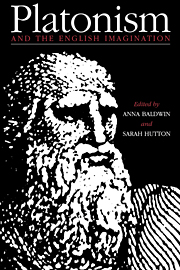Book contents
- Frontmatter
- Contents
- Notes on contributors
- Preface
- I ANTIQUITY
- II THE EARLY CHRISTIAN PERIOD AND THE MIDDLE AGES
- III THE RENAISSANCE AND THE SEVENTEENTH CENTURY
- IV THE EIGHTEENTH CENTURY
- V THE NINETEENTH CENTURY
- VI THE TWENTIETH CENTURY
- 24 Introduction
- 25 Yeats and Platonism
- 26 Virginia Woolf and Plato: the Platonic background of Jacob's Room
- 27 Plato and Eliot's earlier verse
- 28 The Cantos of Ezra Pound: ‘to build light’
- 29 Platonism in Auden
- 30 Platonism in Iris Murdoch
- Bibliography
- Index
26 - Virginia Woolf and Plato: the Platonic background of Jacob's Room
Published online by Cambridge University Press: 15 December 2009
- Frontmatter
- Contents
- Notes on contributors
- Preface
- I ANTIQUITY
- II THE EARLY CHRISTIAN PERIOD AND THE MIDDLE AGES
- III THE RENAISSANCE AND THE SEVENTEENTH CENTURY
- IV THE EIGHTEENTH CENTURY
- V THE NINETEENTH CENTURY
- VI THE TWENTIETH CENTURY
- 24 Introduction
- 25 Yeats and Platonism
- 26 Virginia Woolf and Plato: the Platonic background of Jacob's Room
- 27 Plato and Eliot's earlier verse
- 28 The Cantos of Ezra Pound: ‘to build light’
- 29 Platonism in Auden
- 30 Platonism in Iris Murdoch
- Bibliography
- Index
Summary
Virginia Woolf was a serious Platonic scholar and her writings allude to Plato and the dialogues, but to call her a Platonist would be a mistake. Woolf's work does not conform to any ‘-ism’, and Platonism is no exception; her philosophy is of the ‘rag-bag’ sort, not adopting or promoting any system, but transferring philosophical metaphors and ideas into the contexts of real and fictive experiences. Her writings do not engage with Platonic arguments, but rather draw from the dialogues to inspire, complicate, and support her own aesthetic ends.Woolf's poetic expresses a neoclassical delight in formal unities of design, rhythm, and imaginative human purpose, alluding parodically to Plato and subsequent academic pursuits of philosophy, while metaphors of the cave, darkness/illumination and mimesis, for example, reimagine Platonic motifs in twentieth-century contexts. She was aware of the complex religious traditions suggested by these allusions, but her own anti-religious sentiment was closer to the Heretic Society than to doctrinal,especially Christian, Platonism.This essay will explore what exactly Plato meant to Woolf and how her Platonic allusions operate, particularly in the context of nonrealistic parodic fiction.
It is clear that Woolf felt the importance of Plato very strongly. In the essay ‘Is This Poetry?’ she declared that the works of Hogarth Press were ‘addressed to no public save that which has in it the ghosts of Plato.’ Seven of her nine novels, along with short stories and two volumes of essays, were included in the more than 400 titles Hogarth published during her lifetime, and her haunting remark invites readers to ponder what she really meant.
- Type
- Chapter
- Information
- Platonism and the English Imagination , pp. 290 - 297Publisher: Cambridge University PressPrint publication year: 1994



